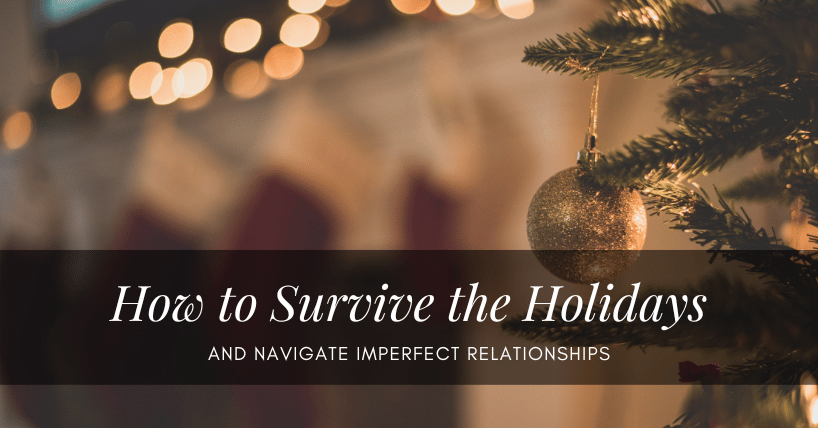How to Survive the Holidays
"He never does anything besides show up and expect me to have gotten all the gifts and smoothed over everybody's feelings. I help out in the kitchen before meals, jump up to clear the table afterward, and ask everyone about their lives and work. He just sits in a corner, tuned out to everything that's going on. It's exhausting and demoralizing."
This quote is from an imaginary client I'm calling Andie, made up of many people over time. She's constructed primarily from various clients but includes a smattering of details from friends and colleagues.
Holiday Survival and Gender Dynamics
Based on those collective experiences, I know some of this is familiar to you if you're in a hetero couple. Even for those of us who've done work to build relationships that don't fall into gender stereotypes, the holidays are like a gravity well from which none seem to escape. Men who are active, involved fathers, who break most of the molds left for them by previous generations, are still left out of much of the *work *of holidays. Even among men who know their way around a washing machine, who buy groceries and change diapers, many still don't do their share of the gift shopping, wrapping, planning, hosting, or relationship management involved in holidays.
Let's imagine that Andie has been working on her perfectionism and anxiety for several months. Now that the holidays are coming up, she's got this problem on her mind. Her husband Jude is a great guy, and they have a pretty solid relationship, but she doesn't feel great about how they deal with conflict. She's foreseeing a lot of resentment over the next month as she pictures their usual routines unfolding.
What Work-Life Balance?
Andie's life includes a fair bit of stress on a typical day. Everything gets turned up to eleven during December. She has two children under six and works from home for part of the week. She loves the flexibility it gives her, but it also means she is the parent who handles pediatrician appointments, teacher meetings, and so on. When schools are closed for two weeks over winter break? Andie is the default parent taking care of the kids. She still has work deadlines, plus a brimming additional task list of Holiday Things.
There are conversations with extended family about gatherings, food, and who's doing what this year. There's shopping, decorating, and deciding which activities her kids will be able to handle without going overboard and a) spoiling them or b) everyone melting down because of missed naps or general exhaustion.
There's determining how much is too much over budget to get the ultimate gift for her father-in-law. There's taking on the Un-fun Parent role and saying it's too late to start a Christmas movie because bedtime is a linchpin on which everything else relies.
It’s a Struggle Even with a Solid Foundation
Jude isn't oblivious. He notices her foul mood and offers to help, but she still has to tell him what to do and then check in when it's not done on time or to her standard.
By the middle of the month, Andie feels drained. At this point, the actual holiday bustle has yet to start! She's anxious, overwhelmed, stressed, resentful, and lonely.
The Options (and the Injustice)
If Andie were interested in getting some help from me and changing things in her life, we'd have a few options.
We could work on changing the way she feels about the situation as it stands - that is, we assume that she and Jude stick with their roles as usual. Still, she would want to feel relaxed and content, perhaps even close to Jude, without changing anything about their situation.
Alternatively, we could work on changing the way Andie communicates with Jude.
Both options are a little unsatisfying, aren't they?
She's already doing all this work! She's drained, exhausted, and lonely. Now she would be responsible for working on her communication habits!
There’d Be Some Benefits
Now, it's true that the skills she'd learn would be valuable beyond the holidays. They'd go beyond her relationship with Jude, even. They might have sweeping effects on her anxiety in general.
Think of it this way: if Andie typically steps back, keeps her head down at work, and avoids expressing her ideas and opinions for fear of conflict, she probably feels resentful and anxious there too. By learning a different way to communicate, she might feel more at ease in navigating discomfort with other family members. She'd likely have better relationships with her children over the decades! It might be a very worthwhile investment.
But Still Lots of Unfairness
Despite all of that, there is a fundamental unfairness to the proposal. There’s also the logistical piece of it - if she did want to work on her communication, it’ll take time and that’s the main thing she doesn’t have! What would you say if you were Andie?
The Decision
Many clients sensibly decline this help and choose to work on something else instead. Others don’t though - so let's imagine that Andie is among the ones who want to push forward. She believes it will pay off and that, even though it will be challenging and sometimes painful, it will improve her relationship and bring her closer to Jude. She knew it would be hard work that would likely not even pay off over the next four weeks of stressful holiday conflict, but she believed it would be life-changing in the long run and probably would make next year much more enjoyable.
Before even thinking about communication techniques, I would offer a method to build Andie's compassion for Jude and her understanding of his behavior. The one I have in mind is powerful but demands a solid therapist-client relationship and a strong sense of self-worth. If Andie suddenly stopped believing that Jude was the bad guy only to start believing that she was, we'd be in bad shape.
Embodied Empathy
Imagine that Andie is fully committed to Jude and that she likes and admires many things about him. She's still thinking about him in a one-dimensional way concerning their division of holiday labor. She's telling herself that he's lazy, uncaring, and oblivious. If Andie wanted to see Jude differently so she could approach him with genuine hope for connection, I would offer Embodied Empathy*.
Embodied Empathy is a role-playing technique in which I would invite Andie to play the role of Jude and talk to me as if she were Jude, telling me his perspective on all of this.
*Note: The technique I’m calling Embodied Empathy is the same as the technique called Forced Empathy developed by Dr. David Burns. I prefer the different name because “Forced Empathy” strikes me as somewhat punitive and harsh. Whatever you call it, I’m so grateful for its creation. It is indispensable as a way to shift feelings of compassion and connection within a relationship.
Embodied Empathy in Action
Me: Okay, Andie, are you ready to get started?
Andie: Yeeahhhh... I think so.
Me: Great. Okay, in a second, I'll ask you to physically stand up and sit back down again as Jude so we can get into the spirit of the roles. Before you do that, though, I want to review some rules. First of all, I'm going to be myself and ask Jude some questions. You'll pretend to be Jude as if he's on truth serum and speaking from his best self, and tell me about Jude's tender feelings about his own experiences.
When I've done this method myself, sometimes my defensiveness comes into the role play, and I end up being the other person not at their best. If that happens here, which would be completely normal, I'll guide you back to being Jude at his best. I'll prompt you to think about what Jude would say in his most open, heartfelt moments.
Okay, are you ready? Let's have Andie leave the room and invite Jude to come in.
Andie: <rolls eyes>
Me: (laughing) I know, it feels pretty goofy. If you don't want to do this, we can absolutely stop. We can go back to working on your challenges with the big project at work. Do you want to do that?
Andie: No, no, I can do this. I want to do it. I know my relationship can be better, and it's worth it. Super awkward! But worth it.
Me: Okay, if you're sure about that, stand up, and when you sit back down, you'll be Jude.
Andie (as Jude): Uh, hi.
Me: Jude, it's great to meet you! I've heard a lot about you, and I know you know that Andie has been putting in a lot of effort at home and in your relationship. I've heard enough about you to know you must be a great guy and that you know how awesome she is.
Andie (as Jude): I guess so.
Me: That seems pretty clear to me! I know you see how much Andie does to support your kids and your family. I'm personally in awe of how energetic and organized she is - I can just imagine what it's like to be her this time of year! She's already running on all cylinders on an average Wednesday - add in all the extra stuff, and it must be pretty intense.
Andie (as Jude): Yeah, I tell her how impressive she is all the time.
Me: I love that about you! Andie has told me what a terrific partner you are, and I'm not surprised to hear that part of you here today. I'd like to ask you some questions about what the holidays are usually like for you.
Andie (as Jude): Sure.
Me: Great - so what are the holidays like for you in general? How do you spend your time? Do you enjoy this time of year?
Andie (as Jude): Oh, totally! It's great! I get to put my feet up, and Andie works everything out - I just sit back and get waited on hand and foot. What more could a person want?
Me (making time out gesture): Time out from the role play for a sec - is that how you think Jude truly feels? Or could this be some of that less-than-best-self we thought could creep in here?
Andie (sighing): Yeah, you got me. I couldn't help myself, I guess! Okay, I'll give it another shot.
(closes her eyes and gets back into her role)
Andie (as Jude): Well.... It's a little alienating. I don't get to spend that much time with just Andie, and she's usually in a bad mood because she's so overwhelmed. I offer to help, but it's always been her gig, so I don't know what I'm doing. I usually go off by myself because it's better than feeling like I'm in the way or incompetent or something. I'd prefer to work on things with Andie, but I can't read her mind, and I don't know what she expects of me. I end up feeling rejected and....lonely.
Me: Yikes. That sounds pretty painful.
Andie (as Jude): It is. I mean, doing the work isn't entirely thankless, and Andie usually seems pleased with herself. She also spends more time connecting with other people while I get shunted off to fend for myself.
Me: It seems like maybe this situation is not that great for you after all?
Andie (as Jude): Yeah, I think I'd be better off helping, but, as I said, I have no idea where to start.
Me: Ohhhh... are you saying you kind of need some on-the-job training to be able to take on some of the load?
Andie (as Jude): I guess maybe I do. It feels like it should just come naturally to me - y'know, Andie never had to sit down and learn a checklist of best practices for gift shopping or making small talk with relatives, but I guess she was getting trained for that as a kid without even knowing it.
Me: Is that something you'd be willing to do? It sounds humbling to have to do that as an adult.
Andie (as Jude): That's a good point. I might be resistant sometimes, but if Andie and I were better at working through it when we're feeling resentful, we'd be able to be more of a team. I won’t love every part of it but I can definitely see big benefits to it.
In an actual session, we'd go on a bit more, ask some more questions, and confirm we're getting to the crux of Andie's frustrations with Jude.
This technique can be intensely moving when done carefully and with lots of compassion for both people in the relationship. More often than not, it involves tears.
Those tears are usually essential ingredients in the next step that would come next - learning to communicate uncomfortable feelings in a way that builds connection instead of creating conflict. That goal requires us to see the other person as a complete human being with their own motivations and experiences. It can only succeed if we approach the conversation with love and care rather than a goal to win, dominate, or be proven right.
Using the Embodied Empathy technique and learning communication skills are both challenging and require us to push ourselves through some discomfort. The role-playing method can’t give us definitive answers about what’s going on with the other person. For that, we’d need to ask them directly. But it’s shockingly effective at creating a feeling of closeness and compassion where previously there’d been distance and resentment.
They're also among the most rewarding things we can do for ourselves and our relationships.
Cheryl Delaney, MS, LPC
Cheryl Delaney is a therapist who specializes in perfectionism and offers online mental health counseling in the state of Georgia. She loves that therapy means laughing and crying with her clients. When she’s not working, Cheryl is probably listening to a podcast or playing Legend of Zelda: Tears of the Kingdom.












